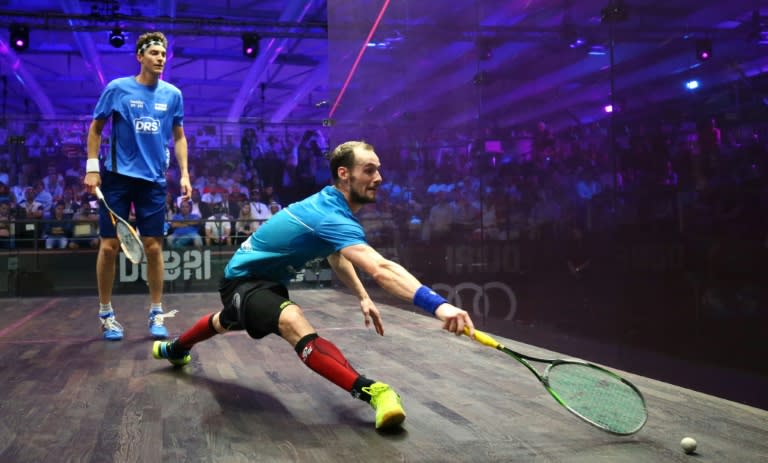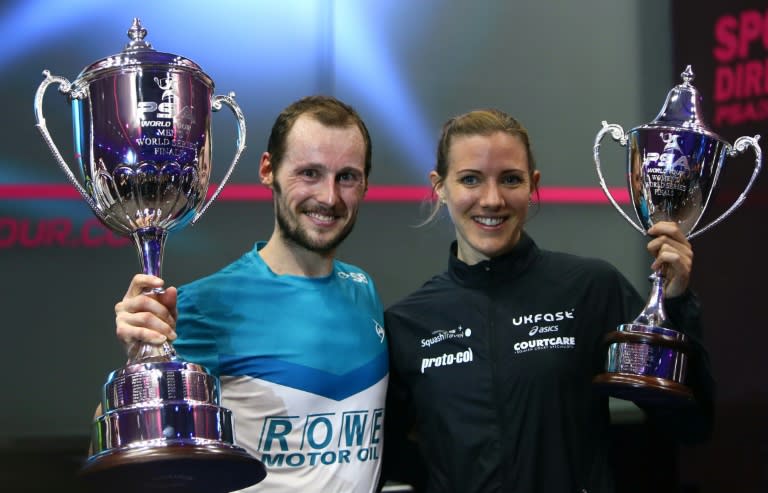Squash champion Gaultier halts Aussie Pilley's sensational run
World champion Gregory Gaultier beat Australia's surprise finalist Cameron Pilley to regain the title at the PSA World Series finals on Saturday after a seven-year interval. The Frenchman's 11-4, 11-5, 8-11, 11-6 win over the Australian was proof that his six-month "nightmare" was over following a serious ankle injury. However, after quelling a fightback by a very celebrated underdog, Gaultier has proved he can at last pursue his ambition to challenge Mohamed El Shorbagy for the world number one spot again. The Egyptian was the man whom Pilley remarkably beat to reach the final, despite never having qualified for this season-end showdown before, or even having reached the world's top ten. That looks a possibility for him now, especially on the evidence of the third game, in which Pilley found ways to stop Gaultier from scoring so heavily in the top left corner and prolonged the rallies enough to bring more physical qualities into the equation. "If I had sunk my teeth into this match like that a little earlier, I could have done more," Pilley reckoned. "But I can't be unhappy with what's happened. It's been the best week of my career and I believe the best can still be ahead of me." Both men are 33. Gaultier looks more than good enough to be at the top for a while yet, and as motivated as ever. "There's no stress on me now I have done what I always really wanted to do," he said, referring to his World Open triumph in Seattle in November, when at 32 he became the oldest man to win that title for the first time. "And physically I feel great again. That nightmare is over. I'm enjoying what I do. I have no stress any more, and when you have no stress you play well." Despite that, Gaultier half-joked that he had been forced to "warm up about ten times" because the women's final had lasted so long, more than an hour. - Squeezing away - It was also a fine contest, with Laura Massaro, the top seed from England, just squeezing away from trouble in a very tight fourth game, to win 9-11, 11-6, 5-11, 12-10, 11-5 against Raneem El Welily, who last year was the first Egyptian woman in any sport to become a world number one. Had she played those two rallies at 10-10 a little more accurately, she would have won her biggest title yet, and might have created a platform from which to launch herself to number one again. But her wonderfully gifted strokes, though more consistent than they used to be, did not deliver the goods in those pressured moments. "I was stupid," she castigated herself afterwards, without precisely elaborating why, though "rushing" was a self-criticism she later made. Massaro's strengths were focus, accuracy, and good tactical combinations. "At the beginning of the fifth game I told myself that it's one more game, and then it's the end of the season, with a big prize at the end of it -- so just go for it," she said. "It was the right approach because I was as relaxed as I have ever been for that game, and I think I hit my targets and made the right choices." It earned her $42,000 (37,800 euros) -- the biggest prize in the history of the women's game, which in this event has a fund equal to the men's. With the mix also containing Nour El Sherbini, the world champion, and a still very competitive Nicol David, the most successful woman in the history of the professional game, the women's tour has never looked better.




